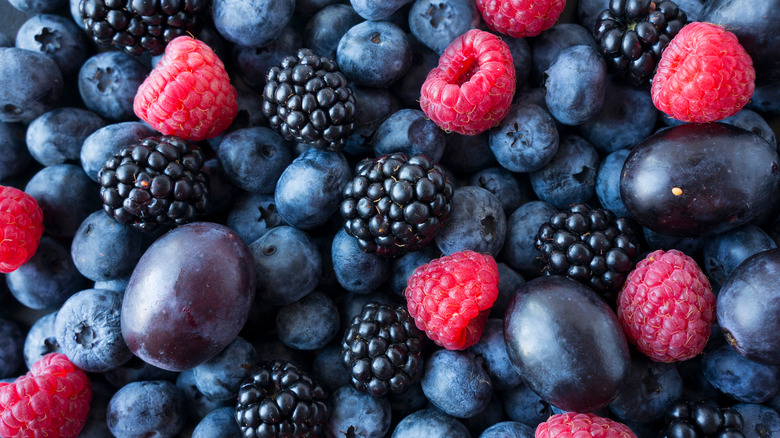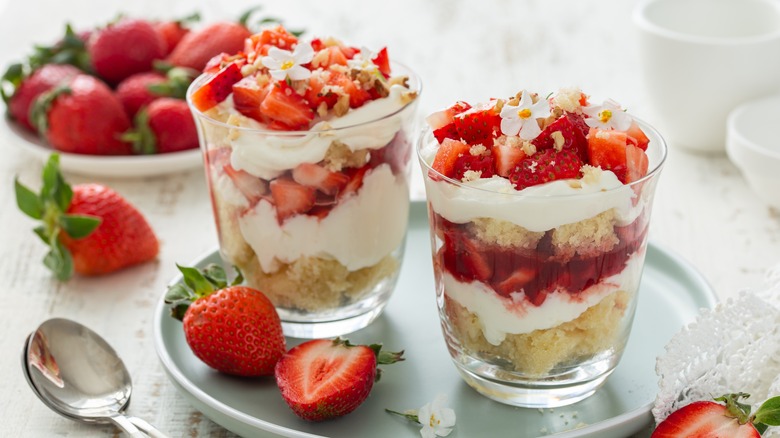Can Eating Berries Help Control Breakouts?
Remember the saying, "Beauty starts from the inside out?" What you eat and drink directly impacts skin health, and no cream or lotion can compensate for a poor diet. In fact, it's common to experience breakouts or other skin problems after eating high-fat or sugary foods as suggested by a 2020 study published in JAMA Dermatology, via the National Library of Medicine. As the researchers note, acne is an inflammatory disease and can flare up in response to certain foods, especially those containing refined carbs.
The American Academy of Dermatology Association (AAD) warns about the effects of white bread, fries, rice cakes, and other high-glycemic foods in relation to skincare. These products cause blood sugar spikes, which may lead to inflammation and excess sebum production. As a result, they can trigger or worsen acne. The same goes for cow's milk, an otherwise healthy food with low sugar content. A possible explanation is that the hormones in milk may have inflammatory effects.
All in all, your favorite carbs could be causing breakouts, but it's never too late to do something about it. For starters, You may consider adding more berries to your diet to help control your acne. But could is it just a myth or do berries really control breakouts?
Your secret weapon against skin inflammation
With their naturally sweet flavor, berries can be a delicious, healthy addition to most diets. You may not know that they boast antioxidant, anti-inflammatory, and hypoglycemic properties. These potential benefits are most likely due to their high content of anthocyanins, epicatechin, quercetin, kaempferol, and other flavonoids, according to clinical research presented in the Current Opinion in Food Science.
Several studies suggest that berries help regulate blood sugar levels and fight inflammation, as noted in the above review. For example, ellagic acid and other antioxidants in these fruits inhibit pro-inflammatory cytokines and reduce oxidative stress, which is a contributing factor to inflammation. Moreover, berries are lower in sugar than other fruits and may help prevent breakouts, per Live Science. The AAD and other skincare experts recommend eating a low-sugar diet to reduce excess sebum and manage acne.
These fruits also pack large amounts of vitamin C, an antioxidant that promotes skin health. Michelle Braude, a medical doctor and nutritionist, is particularly fond of goji berries, saying they boost immune function and prevent inflammation, which in turn may help reduce breakouts, via La Roche Posay. Strawberries, raspberries, elderberries, and blackberries are rich in vitamin C, too, per My Food Data. They also contain dietary fiber, which may help control breakouts.
How to reap the benefits of berries
Berries alone are unlikely to reduce acne, but they can do wonders when consumed as part of a balanced diet. These juicy fruits can nourish your skin from the inside out and protect against diabetes, obesity, heart disease, and memory problems. Plus, you can buy them in bulk during the summer and freeze them for later use. "Freezing doesn't destroy any of the compounds — in fact, it may preserve some," said neuroscientist Barbara Shukitt-Hale in an interview with The Washington Post.
Generally, it's best to consume these fruits raw because vitamin A, vitamin C, thiamin, folate, and other nutrients are sensitive to heat. For example, cooking can destroy up to 80% of their thiamin content, reports a study published in the Journal of Food Composition and Analysis (via ScienceDirect). What's more, high heat can affect their antioxidant levels and boost their sugar content (due to water loss), said food scientist Guy Crosby in an interview with HuffPost.
Apart from that, let your imagination run wild and experiment in the kitchen. Enjoy these delicious fruits raw, sprinkle them over pancakes, or mix them into smoothies to reap the benefits. If you plan to eat strawberries every day, try mixing them with coconut or almond milk and freeze them to make popsicles or ice cream. You can also incorporate them into fruit or vegetable salads, dip them in dark chocolate, or stuff them with cottage cheese and wholegrain crackers.


